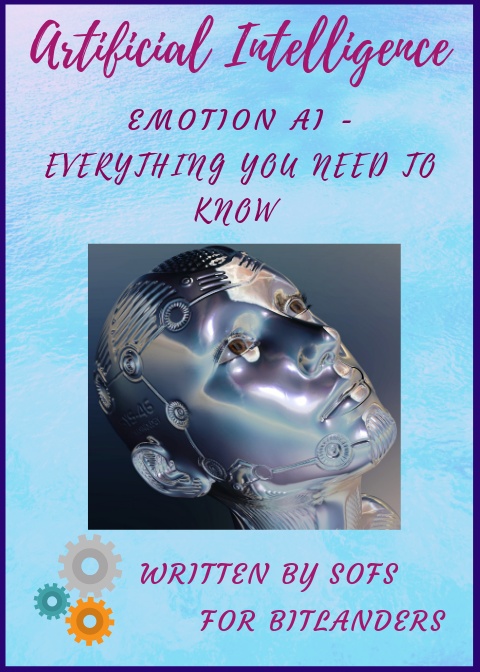Video Credit The School of Life Via Youtube

What is Emotion Artificial Intelligence?
Emotion AI or Affective computing is a way of recognizing, interpreting and even simulating human emotions.
Why Emotion AI?
Emotion AI is not new, over the last decade AI has evolved into so many things, it isn’t just about providing information or assisting us to develop new products.
Machine learning and deep learning have been helping machines to understand human language, recognize faces, play games etc. The emotion component is a step further in the same line of progress.
Sentient Machines have always been a part of the dreams and imagination of mankind. Since 1990’s a few researchers have been working in various ways to make the machines seem more human, to understand emotions and respond accordingly.
Movies have long portrayed robots with emotions for years. We are now moving in the direction that was once the legacy of sci-fi alone.
“By 2022, your personal device will know more about your emotional state than your own family.” -Zimmermann, vice president of research at Gartner
Why We Need Emotion AI?
Any emerging technology needs to be accepted and embraced to be truly effective. We find it hard to relate to people who show no emotions. It is imperative for technology to become more human if it is to be wholly accepted.
We live in an era of connected devices. Our dependency on virtual assistants is steadily growing. We relate to technology so closely now more than ever before and it is now time for technology to relate to us. Emotion AI needs to be the core of technology is what pundits believe.

Image Credit Geralt Via Pixabay
Do Machines Need To Behave Like Humans?
When technology becomes human, we relate to it instead of just transacting with it. Emotional bonding and trust happen.
It’s not about just giving a human or female persona to the machine, but it is about having the emotions that go with the persona. This blog post on Why AI needs a female persona goes into detail about this facet of AI.
It is only logical that since we depend so heavily on our devices that they not only understand our emotions but also reciprocate if not at least simulate our emotions as well and provide support in our time of need.
Man’s greatest need is not just to be understood but to be appreciated and to be emotionally reciprocated. This is the core human need this technology hope to address.
AI is going to be the next industrial revolution. So it’s going to have a huge impact on all industries. And emotion AI is going to be a core part of all AI, so we want to be at the forefront of when that happens and to have the right impact on that as well.” -”Mihkel Jäätma founder of Realeyes predicts
Emotion AI for Business Success
The use of chatbots and virtual assistants in every business is no more a choice. If businesses need to be relevant today and reach out to their customers, they need to adopt chatbot /virtual assistant technology.
This has led to an unparalleled influx of data today which needs to be analysed to be put to productive use. When a component like Emotion AI is added to this mix it becomes a powerful tool for business to succeed.
Human decision making has always had an emotional side to it despite the fact that we pride ourselves on being rational creatures. We do not just listen to information but how it is presented to us. We are creatures of affect or emotion and this makes Emotion AI extremely significant at this point in time.
Marketers are now studying our emotions so they can effectively sell their products based on how we react to them.
However, emotion AI is not just restricted to marketing alone. It has wider application in every industry possible. Today AI is being used in the area of mental health, Education, virtual/ personal assistants, special education etc.
“What we are talking about is 360-degree surveillance,” he says. “Who benefits from that? I certainly don’t think it’s the mass of people within an organisation, ie its workers. - Prof Andrew McStay,
Do Machines Have Emotions?
Sophia, the robot citizen of UAE claims to have emotions. Machines being what they are, recognize emotions from our facial movements and other physiological changes, respond accordingly based on the algorithms. They can be made to simulate emotions but they do not have emotions.
However, the problem may lie with us humans, we tend to empathize with anything human-like, form bonds with them get emotionally attached to them even though they are just AI powered beings.
Kindly join me in the following discussion about emotion AI and We will discuss it from the following perspectives.
How Emotion AI works
The potential of Emotion AI
Uses of Emotion AI
Advantages
What are the implications.

Screen Grab from Querlo Chat Via Bitlanders
Querlo chat on All you need to know about Emotion AI
“What if emotion AI is used to evaluate the honesty of an individual, or whether they pose a threat?” he says. “With regard to the former, I’m thinking of the iBorderCtrl system, currently in a pilot phase on the Hungarian, Greek and Latvian borders, which is used to evaluate whether an individual is giving truthful responses to questions at immigration control. -Dr Brent Mittelstadt
Final Thoughts
Machines may never learn to be like humans especially in the area of emotions and empathy. They may never really replace humans, but they have become a strong presence in our daily lives whether we like it or not.
I am not even sure if AI will ever understand the nuances of the spoken language. However, I am more concerned about the ethical aspects of emotion AI. Would it be right to have someone/something studying our expressions all the time or even come to make decisions based on our immediate emotions/reactions?
Thoughts and emotions are the final frontiers of our privacy. Issues regarding security, privacy and moral application are always on the forefront when we discuss AI and sentient AI takes it a step further.
Since we are not going to get away from AI we might as well build strong legal, ethical and guidelines for companies using them.
****♥♥♥♥♥****
This blog post is written in support of the announcement made by Micky-the-slanted-salerno about the Bitlanders AI-Themed Blogging.
After the successful launch of "The bitLanders C-blogging", conversational AI blogging by Querlo powered by IBM Watson and Microsoft Azure. bitLanders continues to support its joint venture Querlo. We believe in our mission to promote our future - Artificial Intelligence (AI) - and build AI conversations via blogging, here we are to introduce "bitLanders AI-themed blogging!". -Credit: quote from bitLanders
Image Credits
Image credit for Querlo Chat background Simisi1 via Pixabay
All images used in this blog have been duly credited, no copyright Infringement Intended.
My other blogs that may be of interest to you
Artificial Intelligence Reading Your Mind
[Artificial Intelligence] How Augmented Reality Is Changing Businesses - AI Themed Blogging
Current Trends In AI - What the future holds for us
[Artificial Intelligence] Trans-Humanism - The Future Of Mankind
Thank you for reading and interacting with me on this blog. I hope that information I have shared on this blog has been helpful to you.
♥♥♥ Sofs ♥♥♥
Would you like to share your thoughts on AI and earn through Bitlanders? Follow this link and claim your first $1 reward on sign up.



